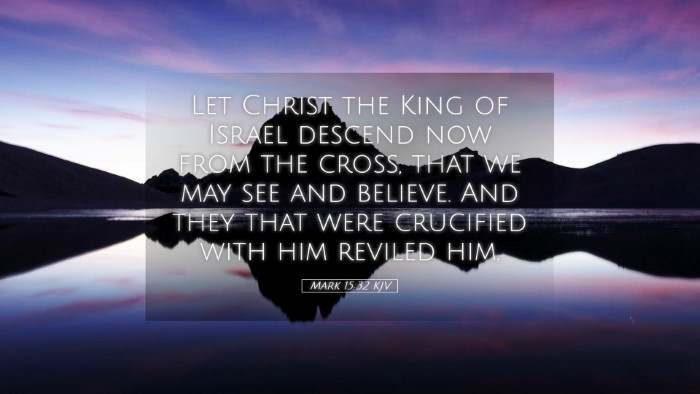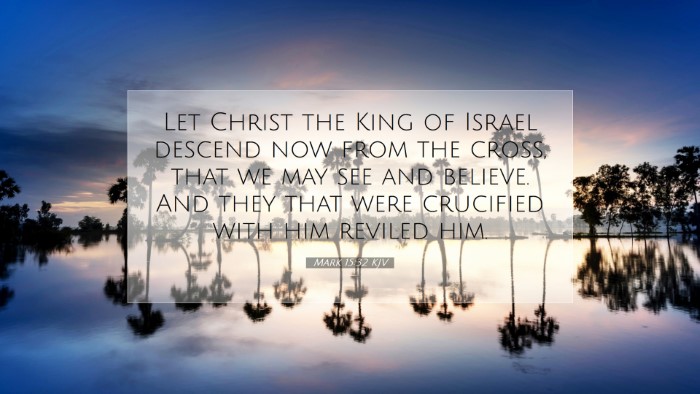Commentary on Mark 15:32
Verse Text: "Let Christ the King of Israel descend now from the cross, that we may see and believe. And they that were crucified with him reviled him."
Introduction
This poignant verse captures a critical moment in the crucifixion narrative, revealing profound themes of faith, mockery, and the nature of Christ's kingship. The scene is set at Golgotha, where Jesus hangs on the cross, surrounded by His mockers, including the religious leaders and those crucified alongside Him. This commentary aims to explore the theological implications and historical context of Mark 15:32 through insights drawn from respected public domain commentaries.
Contextual Analysis
In Mark 15, we find Jesus in His final moments, enduring the intense scorn and ridicule from those present at His crucifixion. The cries to descend from the cross reflect a misunderstanding of His mission and the nature of His authority. The leaders imply a challenge, illustrating their disbelief in His identity as the Messiah.
Mockery of Kingship
Matthew Henry highlights the irony of the mockers addressing Jesus as the "King of Israel." Their challenge to prove His divine authority by descending from the cross is filled with scorn, yet it inadvertently acknowledges His kingship. This mocking demonstrates how the wisdom of God contrasts with worldly understanding, where true power is often revealed through suffering and sacrifice.
The Nature of Faith
Albert Barnes points out that the cry for Jesus to come down from the cross is indicative of a faith that demands physical evidence. Such faith lacks the depth that arises from recognizing the spiritual truths of Christ's sacrifice. The call for His descent is a temptation, reminding us of Satan’s challenge to Jesus in the wilderness, seeking to divert Him from His redemptive plan.
Reviling from the Crucified
The mention that "those who were crucified with him reviled him" sheds light on the stark reality of human despair and cynicism even in suffering. Adam Clarke elaborates that the response from the criminals indicates a shared human condition where, at the peak of their own anguish, they too participate in the mockery of the innocent, Jesus. This behavior reflects a common desperation that can lead to mutual disdain rather than compassion.
Theological Implications
Mark 15:32 raises significant theological questions regarding the identity of Jesus and the nature of His mission. The verse invites believers to reflect on the meaning of true belief and what it entails.
The True Meaning of Kingship
Jesus’ refusal to come down from the cross is pivotal to understanding His true kingship. The call to demonstrate His power in a way they could verify misinterprets His mission as one of earthly sovereignty rather than spiritual lordship. The Shroud of mockery contradicts what it means to follow Christ, emphasizing that devotion requires acknowledgment of cross-bearing.
Faith Beyond Sight
For Christians, the challenge presented in this verse serves as a reflection on the nature of faith. As Barnes notes, faith must transcend scenarios where proof is palpable. The profound truth that Jesus fulfilled prophecy through His suffering is a testament that belief often emerges from the unseen. This challenge has implications for believers today, who are called to trust in the unseen work of Christ in their lives.
Responses to Christ’s Suffering
The duality of beliefs represented in this passage—mocking disbelief versus authentic faith—encourages readers to consider their own responses to Christ’s suffering. Clarke points out that, while one thief reviled Him and remained unrepentant, the other eventually recognized His innocence and asked to be remembered in His kingdom. This transformation illustrates the power of recognizing Christ’s true nature amidst ridicule and suffering.
Practical Applications
The insights provided by this verse invite pastors, students, and theologians to contemplate the following applications:
- Enduring Mockery: Believers are encouraged to endure ridicule in their faith and recognize that mockery does not negate the truth of Christ’s kingdom.
- Living Faith: Engage in practices that nurture a faith that looks beyond visible evidence, embodying a spiritual reliance on God’s promises.
- Responding to Suffering: Promote empathy and understanding in communities, especially towards those who are suffering, remembering that Christ’s response to pain was one of love and sacrifice.
Conclusion
Mark 15:32 stands as a profound reminder of the complexities surrounding faith, mockery, and the profound truths contained within Jesus' sacrificial act. By examining the challenges presented in this verse, believers are invited to deepen their understanding of Christ's identity and the nature of true belief, which calls them to a faith that transcends the circumstances of life. In this way, they can embody the contrast between worldly wisdom and divine truth, reflecting the power of the cross in a world often steeped in skepticism.


